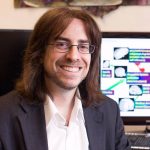Archived Content
This page is archived and provided for historical reference. The content is no longer being updated, and some of the information may have changed over time and could be outdated or inaccurate.

Greg Siegle, Ph.D.

Arielle Baskin-Sommers, Ph.D.
Greg Siegle, Ph.D.
Associate Professor of Psychiatry, Psychology, and Translational Sciences
University of Pittsburgh School of Medicine
Arielle Baskin-Sommers, Ph.D.
Licensed Clinical Psychologist
Assistant Professor, Yale University
Overview
Greg Siegle, Ph.D., will present on cognitive training to address obstacles to recovery. His talk will describe neural vulnerabilities that could help to explain the mediocre success rate of traditional behavioral treatments along with initial data suggesting that we can address these features using targeted cognitive training as pre-treatments. These data lead to an augmented conceptualization of precision medicine in which assessment can be used in traditional ways, to direct patients to different treatments or to suggest pre-treatments to turn likely nonresponders into likely responders to conventional treatments.
Arielle Baskin-Sommers, Ph.D., will present on an experimental therapeutics approach to target antisocial behaviors. Antisocial behavior, from substance abuse to crime, produces suffering for the perpetrator, for their family members, for their community, and for society at large. The underlying cognitive-affective mechanisms tell us why individuals continue to engage in these behaviors, despite the persistence of suffering. Utilizing the approach of knowledge integration from basic science on these cognitive-affective mechanisms to intervention research highlights the path for alleviating this suffering.
Biographies
Greg Siegle, Ph.D., directs the Program in Cognitive Affective Neuroscience at the University of Pittsburgh School of Medicine, where he is an associate professor of psychiatry, psychology, and translational sciences. His research examines neural mechanisms of emotional and cognitive information processing in mood and anxiety disorders, how this information can be used to predict response to treatment and to guide novel treatment development. He works to translate cognitive and emotional neuroscience for use in the real world. Dr. Siegle has over 135 publications and has been continuously funded by the NIH and foundation awards for over 17 years.
Arielle Baskin-Sommers, Ph.D., is a licensed clinical psychologist and an assistant professor at Yale University. She received her Sc.B. from Brown University (2007) and a Ph.D. from the University of Wisconsin–Madison (2013), and she completed her pre-doctoral internship and fellowship at McLean Hospital/Harvard Medical School. Substantively, her research is concentrated on understanding individual differences in cognitive and affective processes as they relate to vulnerability for disinhibited (impulsive, antisocial) behavior. Methodologically, she is interested in integrating a wide range of techniques and technologies to explore this issue. Overall, her professional career goals are based on a desire to develop both innovative theory and research in service of increasing the efficacy of clinical intervention for antisocial behaviors.








